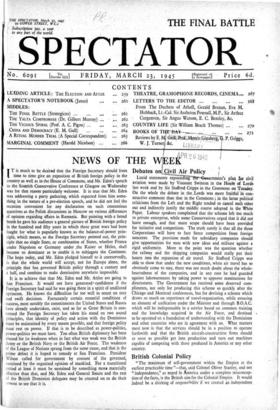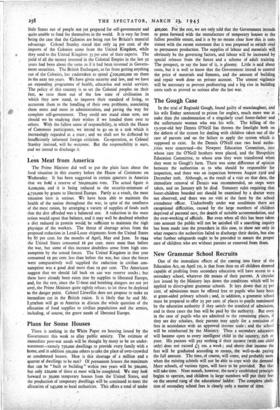British Colonial Policy •
"The maximum of self-government within the Empire at the earliest practicable time "—that, said Colonel Oliver Stanley, and not "independence," as urged in America under a complete misconcep- tion of the facts, is the British aim for the Colonial Empire. It would indeed be a shirking of responsibility if we created 4o independent
little States out of people not yet prepared for self-government and quite unable to fend for themselves in the world. It is very far from being the case that the Colonies are being run for Britain's material advantage. Colonel Stanley stated that only 24 per cent, of the imports of the Colonies come from the United Kingdom, while they send to the United Kingdom 35 per cent of their exports. The yield of all the money invested in the Colonial Empire in the last 50 years had been about the same as if it had been invested in Govern- ment securities. The British Exchequer, so far from getting anything out of the Colonies, has undertaken to spend Doo,oco,000 on them in the next ten years. We have given security and law, and we have an expanding programme of health, education and social services. The policy of this country is to set the Colonial peoples on their feet, so raise them out of the low state of civilisation in which they now stand, to improve their standard of living, to accustom them to the handling of their own problems, associating them more and more in administration, and paving the way for complete self-government. They could not stand alone now, nor should we be studying their wishes if we handed them over to others. With the fullest sense of responsibility, in which the House of Commons participates, we intend to go on in a task which is increasingly regarded as a trust ; and we shall not be deflected by insufficiently informed foreign criticism. Co-operation, as Colonel Stanley insisted, will be welcome. But the responsibility is ours, and we intend to discharge it.



























